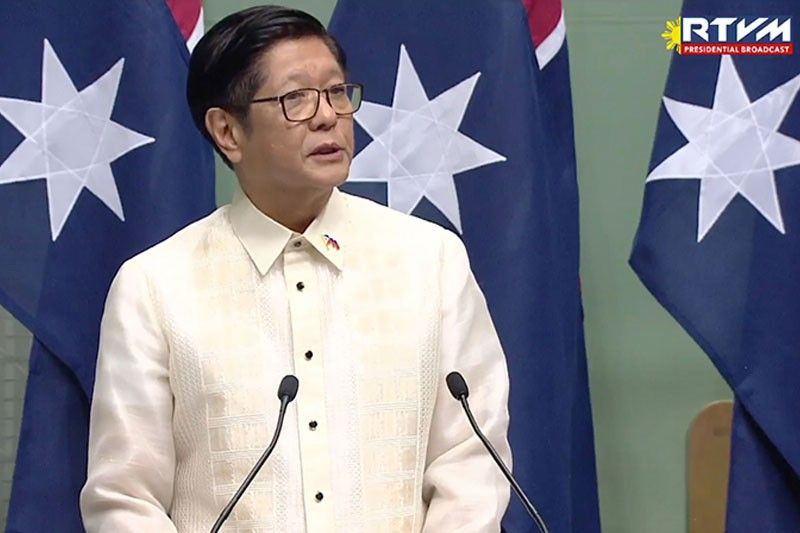Amid sea threat, Marcos Jr. rallies allies

Philippines, Australia sign maritime, cybersecurity agreements
MANILA, Philippines — With peace and stability in the region “under threat,” President Marcos has called on allies to “join forces” in stopping actions that “denigrate” the rule of law, as he vowed to resist any effort by foreign aggressors to seize even an inch of the country’s territory.
Addressing the Australian Parliament in Canberra yesterday, Marcos said the Philippines and Australia have always understood that the region would not have emerged as a driver of the global economy were it not for the predictability and stability of a rules-based order.
He noted that prosperity and development are anchored on peace and stability in the Indo-Pacific region, which is now facing challenges requiring cooperation among nations.
Also yesterday, the Philippines and Australia signed three memoranda of understanding – including one on sharing of information and best practices in cyber and critical technology.
“Today, that peace, that stability, and our continued success, have come under threat. Once again, we must come together as partners to face the common challenges confronting the region. Not one single country can do this by itself. No single force alone can counter them by themselves,” the President told Australian lawmakers.
“This is why our strategic partnership has grown more important than ever. We must reinforce each other’s strengths. We must protect the peace that we fought for during the war and have jealously guarded in the decades since. We must oppose actions that clearly denigrate the rule of law,” he added.
While he did not mention China’s hostile actions in the South China Sea in his speech, Marcos said the protection of the sealane as a “vital, critical global artery” is crucial in preserving regional and global peace.
“The challenges that we face may be formidable, but equally formidable is our resolve. We will not yield,” Marcos said.
“Then as now, the security and continued prosperity of the region – of countries like Australia – relies upon that effort. Just as we fought to build our rules-based international order, so are we now fighting to protect it.”
The President cited the need to “uphold, preserve, and defend” the unified and universal character of the United Nations Convention on the Law of the Sea (UNCLOS) as the constitution of the oceans, saying nations have an abiding interest in keeping seas free and open and in ensuring unimpeded passage and freedom of navigation.
China has been aggressively asserting its illegal claims in the West Philippine Sea, even building artificial island-fortresses on land features and harassing Filipino fishing boats and coast guard vessels. China’s actions have spawned concerns over their impact on freedom of navigation.
In 2016, an arbitral tribunal based in The Hague voided China’s maritime claim, which covers almost the entire South China Sea, and affirmed the Philippines’ sovereign rights over its exclusive economic zone. China has refused to recognize the landmark ruling, even accusing Philippine vessels of “trespassing.”
Philippines on the frontline
Marcos, the first Filipino leader to address the Australian parliament, said the Philippines now finds itself on the frontline against “actions that undermine regional peace, erode regional stability and threaten regional success,” as it did in 1942, when Allied forces fell to the Japanese invaders.
“Then as now, we remain firm in defending our sovereignty, our sovereign rights, our jurisdiction,” the Chief Executive said.
“I shall never tire of repeating the declaration that I made from the first day that I took office: I will not allow any attempt by any foreign power to take even one square inch of our sovereign territory,” he added.
Marcos said the Philippines draws strength from what he described as the “consistent” and “unequivocal” support of Australia and the international community for the lawful exercise of its rights, as enshrined in international law. He also thanked Australia for standing by the Philippines.
“In Australia we see a natural partner in our efforts to defend, to preserve, to uphold our open, inclusive, and rules-based international order, to ensure that it remains governed by international law and informed by the principles of equity and justice,” the Chief Executive said.
In remarks delivered before Marcos’ address, Australian Prime Minister Anthony Albanese said the UNCLOS is “not an abstract notion or a theoretical question.”
“Freedom of navigation is fundamental to our sovereignty, our prosperity, our security and our territorial integrity,” Albanese said.
“Our cooperation is an assertion of our national interests and a recognition of our regional responsibility. It reflects our shared standing that peace depends on more than the presence of the great powers. All of us in the international community, middle powers like our nations as well as smaller nations have a part to play in a more stable, peaceful and prosperous future,” he added.
Peter Dutton, leader of the Australian opposition, lauded the Philippines’ “steadfast” commitment to international law, as articulated by Marcos.
“Mr. President, we find ourselves in times of emboldened autocrats and belligerent regimes who show utter contempt for sovereignty, law and liberty. Your country shows and knows our resolve because your country knows that the threats are real,” Dutton said.
“Together then with our many friends and partners in the region, we must all continue to speak up with courage in calling out acts of intimidation and interference. We must all maintain our strenuous efforts in diplomacy and we must all especially lift our individual efforts to support the collective goal of integrated deterrence.”
MOUs signed
The Australian leader, meanwhile, said the MOUs signed included one that would allow the two nations to share information and best practices on cyber and critical technology, capacity building, promoting a secured digital economy and achieving better understanding of the application of international law norms in cyberspace.
“We also discussed strengthening cooperation on cyber and critical technology and we’ll work together to promote the open and secure use of cyberspace through a new MOU which we have signed today (Feb. 29),” Albanese said.
He also said another MOU aims to enhance maritime cooperation by allowing Manila and Canberra to closely promote their shared vision for the region, including in civil maritime security, marine environment protection, maritime domain awareness and promoting respect for international law.
“We’ll also continue our maritime cooperative activities as regional partners committed to doing our part to sustain peace and stability in our region,” Albanese said.
Marcos noted that defense and security remains a key area of cooperation between the Philippines and Australia.
“We look forward to amplifying our joint activities and the capacity-building efforts in this regard,” the Chief Executive said.
Another MOU seeks enhanced cooperation in competition law and policy, areas described by Albanese as “highly relevant” to both Filipinos and Australians.
Also yesterday, Albanese announced a new $20 million investment to assist the Philippines in reforming and improving access to its justice system.
The Australian prime minister said he and Marcos had “very productive” discussions that focused on enhancing their countries’ collaboration as strategic partners.
“We are ambitious for what we can achieve together and I am pleased that we are working actively to build a peaceful region where international law is respected and waterways are open for trade,” Albanese said.
Marcos said the Philippines and Australia are “natural partners” in the region because of their common set of values. According to him, the Philippines recognizes Australia’s “indisputable” role as a “regional stabilizer.”
“As a flourishing democracy and a staunch advocate of the rules-based order and rule of law, Australia responsibly discharges its economic and strategic capacity, thereby sustaining the regional framework that has allowed us to experience unprecedented growth and peace,” he said.
“As we are situated in such a dynamic regional security environment, I would like to assure our Australian friends that the Philippines will continue to partner with Australia in promoting predictability of actions in the international arena,” the President said.
Albanese said he was looking forward to continued discussions with Marcos at the Association of Southeast Asian Nations-Australia Summit in Melbourne next week.
Senator jeers Marcos Jr.
Not all members of the Australian parliament, however, were welcoming of Marcos.
During his address, The Greens Sen. Janet Rice held up a sign that read “Stop the human rights abuses.”
An attendant promptly ushered her out of the chamber, according to a report by The Guardian. In an X post, Rice criticized the Australian government for inviting Marcos to speak before the parliament, citing the supposed worsening corruption and extrajudicial killings in the Philippines.
“Under President Marcos, Jr., corruption in the Philippines is getting worse. There are hundreds of political prisoners and ‘anti-terrorism’ laws are used as legal cover for extrajudicial killings. Yet the Australian government invited him to address the parliament today. Shame,” Rice said.
Greens Sen. Jordon Steele-John said he was proud to protest in solidarity with the Australian-Filipino community outside the parliament while Marcos was delivering his speech. A photo he posted on his X account showed the protesters carrying banners criticizing Charter change and calling for an end to the giving of military aid to the Philippines. - Emmanuel Tupas
- Latest
- Trending





























